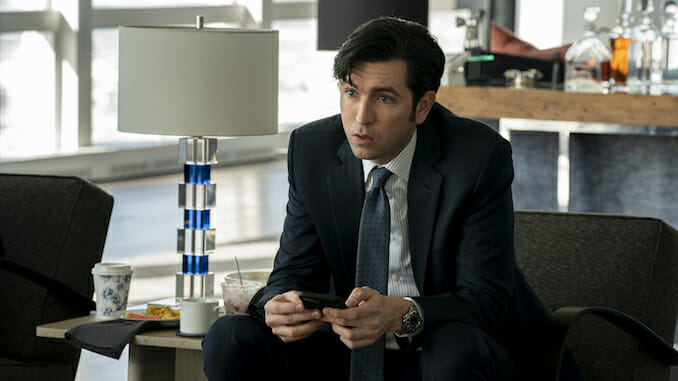Succession Has Sold Us a Lie and Its Name Is Cousin Greg
Photo Courtesy of HBO
I’m not angry, I’m just disappointed. Or more accurately, I’m that mix of angry, elated, and pumped-full-of-adrenaline that Succession makes you feel, especially after Season 3’s “Retired Janitors of Idaho.” Because in the background of the panicked tug-of-war that was Royco’s shareholder’s meeting, a man as dumb as he is tall revealed his soul.
It feels ridiculous to say now, but for a while I honestly thought Cousin Greg was Succession’s endgame. Not to take over the company as has been speculated (that resolution feels like too much of a joke to ever work dramatically), but I believed Greg could “win” Succession by emerging from the whole shitstorm not completely morally destroyed. I thought in the end there could be something left of Gregory Hirsch.
This is partially due to how winningly hysterical Nicholas Braun’s performance of the ambling sycophant is, which helps expand Succession’s comedy as broadly as a drama can allow. And it’s been easy to give some sympathy to this likeable fool; he provides great insight into the anxiety-inducing effect being an intermediary for horrendous people might have on a lackey.
Everyone in Succession tries to get something they want out of Greg—except for Greg. Sure, he asks Tom’s permission to blackmail him, and has no qualms with climbing the corporate ladder without ever deserving his ascension, but his real obstacles seem to be largely internal: a lack of conviction, self-doubt, anxiety, confusion. As such, he’s left in a bizarre between-state of being uncomfortable with much of the Roys’ behaviour, but too cowardly to do anything about it.
Greg stood out early on in Succession as the person with seemingly the most upstanding ideals, and the least ability to stand up for them. But in Season 3, like a pervert with no stage presence, Cousin Greg has anticlimactically revealed himself. His initial siding with Team Kendall is not a righteous act, but a weak display of self-preservation—it seemed like the winning side, until he realized (through a misunderstanding about a $40k watch) that his brave leader just needed something from him whilst having little interest in Greg himself. After joining the Roy joint defence and ditching his grandfather’s long-standing lawyer—and with it, denying the opportunity to actually stand for something—Greg confirmed he’s a paper-thin man desperately trying to convince us he’s made of stronger stuff. And when he discovers his inheritance will go to Greenpeace, he sets about how to affectionately sue his relative.
More than anything, I just feel like a rube. All of Greg’s previous displays of moral fiber now seem performative. Keeping copies of cruise line documents was simply to have leverage and get out of prosecution. His conflicted feelings about working for ATN was less because he couldn’t articulate his principles, and more to do with the fact that he knew he should have some without being smart enough to pinpoint which. (Except for the blindingly obvious, as Tom retorts: “I’m against racism. Everybody’s against racism.”) And even if Greg really did have morals, if he really wanted to take Grandpa Ewen’s lawyer and make a stab at the cancerous system Royco operates on, it would still render him completely useless, as what good are convictions if you’re unable to independently follow them through? You don’t get extra points just for believing something righteous, you have to actually act on it yourself.
-

-

-

-

-

-

-

-

-

-

-

-

-

-

-

-

-

-

-

-

-

-

-

-

-

-

-

-

-

-

-

-

-

-

-

-

-

-

-

-








































